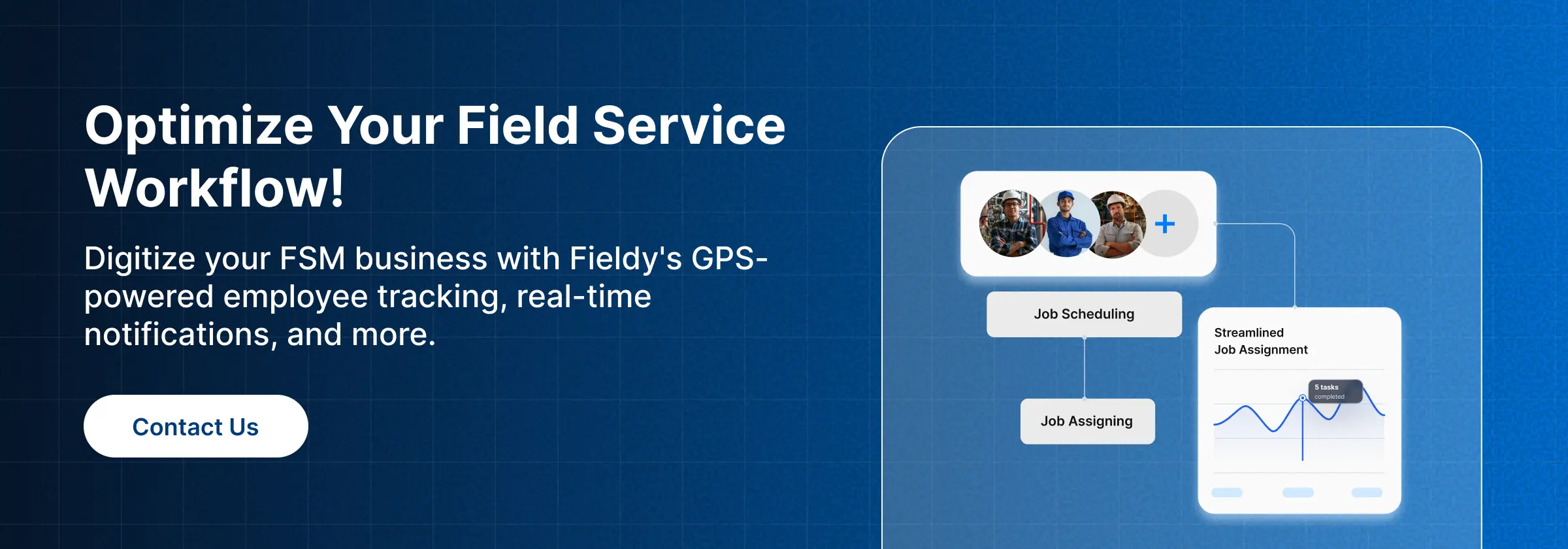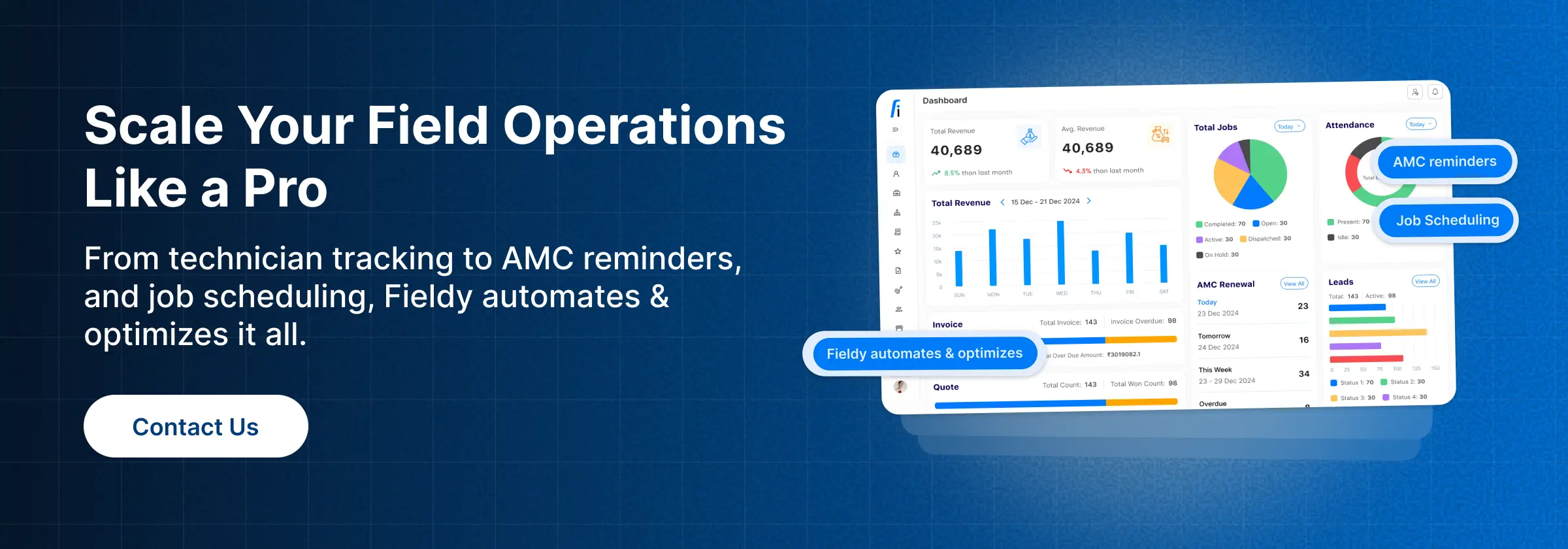👋Introduction
Running a field service business is like driving in traffic with no brakes. You have field technicians, maintenance contracts, and services, all demanding your attention. If you don’t have the right tech, you will have delays, missed services, and inefficiencies that will pile up.
This is the problem job scheduling software fixes. It is a digital service for real-time planning, assigning, and tracking of jobs for service businesses. From plumbing and HVAC to electrical and pest control, this tool makes sure no job is idly waiting, cutting down on useless gaps, and making customers happier.
According to the Service Council, 73% of field service leaders identify scheduling and dispatching optimization as the single most important efficiency improvement. Undoubtedly, scheduling is much more than a calendar; it’s about smooth, integrated operations.
Fieldy, a contemporary field service job scheduling software, alleviates these issues with automation, real-time updates, and technician tracking. It is a breath of fresh air for growing companies because it factors in the new demands of scaling and makes sure they are met.
🛠️What is Job Scheduling Software?
At its core, job scheduling software is a digital tool that streamlines how businesses assign and monitor jobs. In field service management, this means ensuring the right technician is matched with the right job at the right time.
🎯 Key Purposes of Job Scheduling Software
Fundamentally, job scheduling software automates and improves task allocation and tracking for a company. For field service management, this software guarantees the deployment of the appropriate specialist for a particular task within an optimal timeframe.
⚙️Essential Functions of Job Scheduling Software
The software does not simply allocate tasks; it enhances the entire process, making it more intelligent and efficient. Its essential functions are:
📌Streamline Job Assignments
The software uses automation to assign jobs, which ensures that each task is given to the most suitable technician and decreases service delays and overlooked service requests.
⏳Reduce Downtime
Technicians have more time to work on issues and less time waiting or traveling. Businesses experience approximately 20% fewer idle hours with automation.
🗺️Optimize Routes and Resources
Tasks are scheduled and balanced based on location, required skill, and availability, and route optimization reduces fuel and related expenses by 10-15%.
📢Enhance Service Delivery
Trust is built through live service updates, real-time ETAs, and notifications. 73% of customers prefer doing business with companies that provide live service updates.
Industry Insight: Compared to manual methods, companies that utilize job scheduling software experience quicker response times, higher first-time fix rates, and an increase in retention of up to 25%.
Example: Imagine an HVAC business receiving an urgent service request for a broken cooling unit. Instead of manually calling technicians, the system auto-assigns the closest available and qualified technician, reducing response time and customer wait.
🚦Why Job Scheduling Software Matters in Field Service Management?
Field service operations have grown more complex with distributed teams, rising customer expectations, and demand for instant service. Manual scheduling methods (like spreadsheets or phone calls) can’t keep up.
Common Problems with Manual Scheduling:
- Missed or double-booked jobs
- Technicians traveling long distances unnecessarily
- Inconsistent response times
- Limited visibility for managers and technicians
According to Aberdeen Research, companies using automated scheduling see a 25% increase in workforce productivity and a 20% boost in customer satisfaction. For businesses competing in crowded markets, these numbers make a big difference.
Simply put, efficient scheduling isn’t just operational, it’s a competitive advantage.
⭐Key Features of Job Scheduling Software in Field Service
Modern job scheduling software is built to tackle the real challenges service businesses face daily, from double bookings and missed appointments to poor visibility of technicians in the field. Here are some of the standout features that make it indispensable:
📍Real-Time Technician Tracking
With a Field Staff Tracking App, managers can monitor technician locations in real time, assign urgent jobs to the nearest available worker, and optimize travel routes. This reduces wasted time on the road and ensures customers get faster service.
🤖Smart Job Assignment
Instead of relying on guesswork, scheduling software matches technicians with jobs based on their skills, availability, and location. For example, if an HVAC emergency comes in, the system instantly assigns the nearest qualified technician, improving both efficiency and customer satisfaction.
🖱️Drag-and-Drop Scheduling Dashboard
Manual spreadsheets and sticky notes often cause scheduling chaos. A visual drag-and-drop scheduling board makes it simple to shift jobs around, balance workloads, and minimize human errors.
🔁Recurring Jobs & Contract Management
For businesses that handle AMC management software requirements or preventive maintenance contracts, job scheduling tools automate recurring jobs. This ensures no maintenance cycle is missed, protecting long-term client relationships.
📅Calendar & Timeline View
A field service time tracking software integration gives both managers and technicians a clear view of upcoming schedules, job priorities, and pending assignments. This transparency minimizes confusion and improves accountability.
📱Mobile App Access
With a field service management app, technicians can view job details, receive real-time notifications, and update job status directly from their phones, eliminating delays caused by paperwork or back-and-forth calls.
🔔Automated Reminders & Notifications
Missed appointments frustrate both customers and businesses. Automated SMS and email reminders reduce no-shows, while in-app notifications keep technicians on schedule.
Highlight: Unlike many standalone tools, Fieldy’s field service software combines all these features, tracking, smart scheduling, AMC management, mobile access, and automated notifications, into one platform, making it the all-in-one solution for modern field service businesses.
📈 Benefits of Using Job Scheduling Software in Field Service
The advantages go far beyond convenience; job scheduling software delivers measurable impact across the entire service workflow:
1. 👷Improved Technician Productivity
By reducing unnecessary travel and optimizing routes, technicians can complete more jobs per day. For example, plumbing companies using smart scheduling tools have seen 20–25% increases in daily job completions.
2. ⚡Faster Response Times
When urgent requests come in, managers can instantly assign the nearest available technician. This speed of response is a key factor in winning and retaining customers in competitive markets.
3. 🚫Reduced Scheduling Errors
Automation eliminates common mistakes like double-booking or missing appointments. With drag-and-drop dashboards and conflict alerts, managers can schedule confidently.
4. 😀Enhanced Customer Satisfaction
Accurate ETAs, real-time updates, and proactive notifications keep customers in the loop. Studies show that 70% of customers are more likely to rebook with providers who communicate well.
5. 📊Better Resource Utilization
Assigning jobs based on skills and location improves first-time fix rates, reducing costly repeat visits and boosting efficiency.
6. 💰Revenue Growth
When jobs are scheduled efficiently, more work gets completed in less time, directly increasing revenue potential. HVAC providers, for instance, report up to 15% higher sales after adopting scheduling software.
7. 📈Scalability
Whether managing a small team of 5 or an enterprise workforce of 500, scheduling software scales seamlessly, avoiding operational bottlenecks as businesses grow.
Industry Insight: Field service businesses that adopt job scheduling systems achieve up to 30% faster turnaround times compared to those relying on spreadsheets or manual planning.
🚧 Challenges of Job Scheduling & How Software Fixes Them
Even with the best teams, field service businesses face hurdles. Here’s how scheduling software addresses them:
- Lead Leakage & Manual Errors – Fixed with a centralized dashboard ensuring no job slips through.
- Slow Job Assignments – Real-time notifications and instant allocation reduce response delays.
- Poor Technician Utilization – Smart assignments and tracking maximize workforce efficiency.
- Difficulty Measuring ROI – Source tagging and performance analytics provide clarity on revenue impact.
🧠 Fieldy: The Smarter Job Scheduling Software for Field Service Businesses
Fieldy is built specifically for field service teams, combining scheduling, dispatching, and customer management in one platform. Instead of juggling multiple tools or relying on spreadsheets, businesses can plan, assign, and monitor jobs from a single, easy-to-use dashboard.
Why Choose Fieldy?
- 📊Unified Dashboard for Job Planning and Monitoring: Fieldy simplifies operations by centralizing job assignments, technician tracking, and updates. This directly supports the principles covered in What is Work Order Management? Process & Best Practices, ensuring businesses reduce manual errors and maintain end-to-end visibility of every task.
- 💸Zero Setup Fees and No Lock-In Contracts: Unlike bulky enterprise systems, Fieldy is designed to be budget-friendly for SMBs. Businesses can start quickly without the financial risk of long-term contracts.
- 📲Mobile-First Experience Designed for Field Technicians: Technicians receive instant updates, upload job notes, and close tickets right from their phones. This doesn’t just improve completion rates, it also enables managers to apply strategies from how to monitor employee productivity in field service, since every job update, task duration, and outcome can be tracked in real time.
- 🌍Real-World Success: A plumbing company using Fieldy saw a 40% reduction in missed appointments after enabling automated reminders and smart scheduling. This proves how modern job scheduling tools enhance customer satisfaction and workforce efficiency.
With Fieldy, you don’t just schedule jobs, you streamline operations with proven work order management best practices and empower managers with tools to monitor employee productivity in field service effectively.
🏆 Best Practices for Effective Job Scheduling in Field Service
To maximize results, businesses should follow these proven job scheduling practices:
1. 🗺️Factor in Travel Distance & Technician Skills
Assigning the right technician to the right job not only saves travel time but also improves first-time fix rates. For example, HVAC companies that use skill-based routing report up to a 25% increase in efficiency, since technicians are better prepared for the tasks they’re dispatched to.
2. 🤖Automate Where Possible
Automation eliminates delays caused by manual scheduling. With automated reminders, drag-and-drop dashboards, and recurring job setups, businesses can reduce scheduling errors and free up managers to focus on more strategic tasks.
3. 📢Keep Customers Informed
Transparency builds trust. Sending notifications, real-time job updates, and accurate ETAs keeps customers in the loop and reduces no-shows. A Service Council survey found that 70% of customers value communication as much as the service itself.
4. 📏Monitor KPIs Regularly
Tracking conversion rates, response times, technician utilization, and job completion rates ensures managers can identify bottlenecks early. This directly ties into how to improve, track, and measure employee productivity in field service, making job scheduling not just about operations, but also about workforce optimization.
5. 🔄Continuously Optimize Processes
Job scheduling should evolve with business demand. Regular performance reviews, feedback loops, and system updates allow businesses to refine their scheduling strategies over time, preventing inefficiencies from creeping back in.
By following these best practices, field service businesses not only reduce operational headaches but also deliver consistent, high-quality customer experiences.
📡 Recent Trends in Job Scheduling Software
The field service industry is rapidly adopting new technologies:
- 🤖AI-Powered Scheduling – Predicts demand and auto-assigns jobs.
- 🔗Integration with IoT Devices – Equipment sends real-time alerts, triggering instant job creation.|
- 📱Mobile-First Solutions – Technicians rely heavily on apps for updates and navigation.
- ☁️Cloud-Based Platforms – Ensures scalability and accessibility anywhere.
Statistic: Gartner predicts that by 2026, over 70% of field service tasks will be scheduled by AI-driven tools.
📝 Conclusion
In today’s competitive market, job scheduling software is no longer optional, it’s essential. By optimizing technician assignments, reducing delays, and enhancing customer communication, it transforms how field service businesses operate.
Fieldy stands out as an all-in-one solution, affordable, scalable, and built for the unique needs of HVAC, plumbing, electrical, and other service sectors.
Try Fieldy’s Job Scheduling Software today and take your field operations to the next level.
❓ FAQs
What is job scheduling software in field service?
A: It’s a digital platform that automates job planning, assignment, and monitoring, ensuring technicians are efficiently dispatched to customer locations.
How does job scheduling software improve productivity?
A: By reducing travel time, automating assignments, and providing real-time visibility, technicians can complete more jobs per day.
Can small businesses benefit from job scheduling tools?
A: Absolutely. Even a small team gains efficiency by reducing missed jobs and improving customer satisfaction.
What industries use job scheduling software?
A: HVAC, plumbing, electrical, pest control, facility management, IT services, and more.
How does Fieldy compare to traditional scheduling methods?
A: Unlike manual spreadsheets or phone calls, Fieldy automates job allocation, sends instant updates, and tracks performance in one system.




